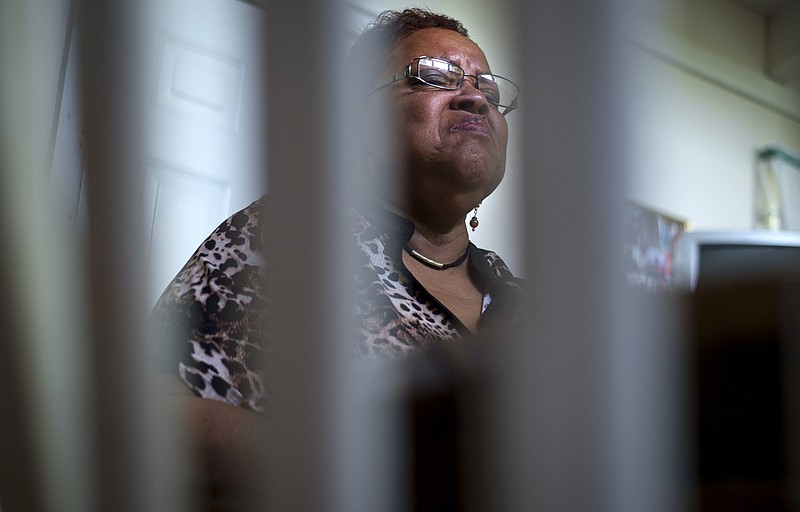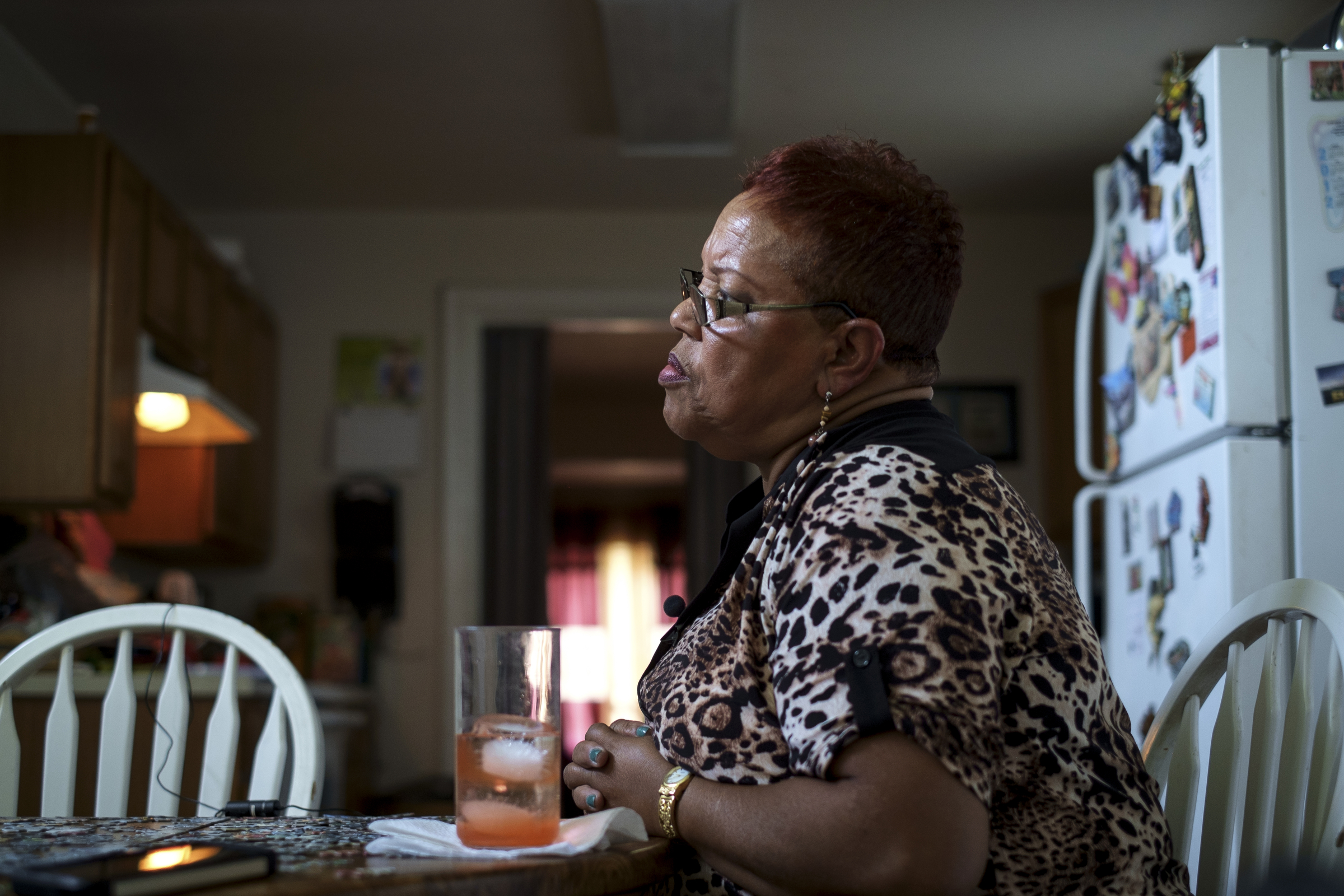Ruth Stewart was barely old enough to drive in 1966 when Jerry Allen - a dapper, smiling, well-dressed teenager - asked her to marry him in the hallway of the chapel at her sister's wedding in Georgia.
He was flashy and charming. They were both 16 years old. She was smitten, and she said yes. They moved into a home on Chattanooga's Southside, but their married life was never happy.
The beatings started almost immediately.
Allen hit Stewart for saying the wrong thing, cooking the wrong thing, and sometimes for no reason at all. He followed her out of the house when she ran from his blows and beat her in the streets. When she was pregnant with their first child, he got into a fight with her one day and kneed her hard in the stomach.
"You're not going to have this child," she remembers him saying.
But she did, a girl. When the baby was just months old, Stewart would hold her close when Allen turned violent, while he taunted her - don't drop the baby, he'd say, as he hit his wife in the head. Don't you dare drop her.
"Usually, I would," Stewart said. "Well, I wouldn't drop her but I'd go down, her on top of me."
Stewart went to her mother and asked to come back home. Her mother told her to stay with Allen. He was paying the bills. She was his wife.
"Nobody talked about abuse," Stewart said. "Where were you going to go? Who was going to take you in?"
Her father hit her mother when Stewart was growing up, and her mother never said a word about it to anyone. So for years, Stewart kept quiet, too.
"I never said nothing," Stewart said.
Until now.
Stewart and her story represent, in many ways, a lost generation. When Stewart, now 64, started her family, there were no such things as domestic violence shelters. There were no abuse hotlines. Women didn't speak about what happened behind closed doors.
So the prevalence of abusive marriages and relationships was relatively unknown. Marriage was sacred - a commitment to be kept at all costs.
Protections only started to fall into place in the 1970s, according to Amy Saathoff and Ann Stoffel, who wrote about the history of community-based domestic violence services for The Future of Children, a journal published by Princeton University and the Brookings Institute.
By the '70s, advocates spurred by the woman's rights movement argued that husbands felt they could beat their wives, and wives felt they had to take it and remain silent - and that reality proved how powerless many women felt in society at the time, Saathoff and Stoffel wrote.
During the next two decades, small shelters popped up across the country, reaching 1,300 by 1997. Thousands of agencies also began to offer services to victims, Saathoff and Stoffel wrote.
And Chattanooga was a part of the revolution. When city leaders gathered to create a future vision for the city during Chattanooga Venture in the 1980s, one of the action items was to create a women's shelter for the city.
Now the city of Chattanooga is part of a new wave of initiatives intended to further address domestic abuse. The new Family Justice Center, which opened July 1 at 5741 Cornelison Road, is a model being used in more and more cities that is intended to streamline services for families at risk.
About 170,000 women reported being the victims of domestic abuse in Tennessee between 2012 and 2014, according to the Tennessee Bureau of Investigation. Women are about three times more likely than men to be abused by a domestic partner, TBI figures show.
About 31 percent of the state's domestic violence victims are black women, and another 41 percent are white women. Black and white men together make up 28 percent of victims, according to the TBI.
Stewart said she's glad to see more support for abused women. During the four years she was married to Allen, she often called the police. Allen would go to jail. But then he'd get out, come home and beat her some more.
Eventually, Stewart stopped calling police.
Her breaking point came on a hot Sunday night when her daughter was about 3 years old. Allen was hitting her, again, but that time, she'd had enough. She grabbed her daughter and her new son and loaded them into a bassinet.
She pushed that bassinet from Third Street to her mother's house on Blackford, she said. Allen followed, beating her as she walked.
"I just didn't want to be hit anymore," she said. "And nothing he could say would convince me that he wouldn't hit me again."
Life after she left Allen was difficult - perhaps, Stewart said, even more difficult than enduring the beatings. Allen stalked her and threatened her. Even after the divorce, he'd show up unannounced at her home, burst through the front door and start smacking her around.
Sometimes her kids, as they got older, would let their dad in through an upstairs window. Sometimes, she'd wake up to him holding a knife to her throat or gun to her head, swearing he'd kill her. Living in constant fear, she turned to alcohol, and drugs. She married three more times; each relationship was abusive.
But when her children were teenagers, Stewart went back to school and became a licensed nurse practitioner. One day, Allen just stopped coming by.
Stewart retired from her 34-year nursing career this month. Allen died a dozen or so years ago. She's never really been able to fully move on, she said. Even as she built her career and cared for her patients, she was fighting inner panic, the fluttering of fear deep inside.
These days, Stewart doesn't often talk with her kids.
"They're not able to forgive me," she said. "They always had a place to stay, clothes and food. But it wasn't enough. I didn't have me to give them. I didn't have the motherhood to give."
For the last five years, Stewart has been living by herself, in a house she owns in Brainerd. She works puzzles and keeps three parakeets in her kitchen. She's planning a couple of trips to celebrate her retirement, and hopes to keep working a day or two a week, just to keep her license active.
She hopes telling her story - and perhaps volunteering at the Family Justice Center to help other women - will be the start of a new chapter.
"I'm happy here," she said. "It's peaceful. I've never had peace in my life until now."
Contact staff writer Shelly Bradbury at 423-757-6525 or sbradbury@times freepress.com with tips or story ideas. Projects editor Joan McClane contributed to this report.

